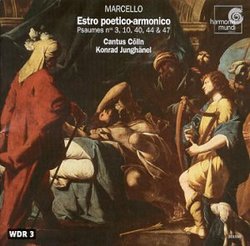| All Artists: Marcello, Cantus Colln, Konrad Junghanel Title: Marcello: Estro poetico-armonico/Junghanel, Cantus Colln Members Wishing: 1 Total Copies: 0 Label: Harmonia Mundi Fr. Release Date: 7/11/2000 Album Type: Import Genres: Pop, Classical Styles: Vocal Pop, Opera & Classical Vocal, Chamber Music, Historical Periods, Baroque (c.1600-1750), Classical (c.1770-1830) Number of Discs: 1 SwapaCD Credits: 1 UPC: 794881506620 |
Search - Marcello, Cantus Colln, Konrad Junghanel :: Marcello: Estro poetico-armonico/Junghanel, Cantus Colln
 | Marcello, Cantus Colln, Konrad Junghanel Marcello: Estro poetico-armonico/Junghanel, Cantus Colln Genres: Pop, Classical
It's a funny thing, the way reputations rise and fall and fade. Nowadays, Antonio Vivaldi is about as well-known as a Baroque composer can be, while his contemporary Benedetto Marcello is familiar to only a few (so far). ... more » |
Larger Image |
CD Details
Synopsis
Amazon.com
It's a funny thing, the way reputations rise and fall and fade. Nowadays, Antonio Vivaldi is about as well-known as a Baroque composer can be, while his contemporary Benedetto Marcello is familiar to only a few (so far). Yet in early 18th-century Venice, both composers were equally respected--in fact, Marcello's music was performed regularly as late as 1790, while Vivaldi's music was considered passé 50 years earlier. Benedetto Marcello, as the scion of a prominent and wealthy Venetian family, didn't have to please the music-buying public (as Vivaldi did) to make a living--and he took advantage of the freedom to follow his own muse. Where Vivaldi stuck closely to established, recognizable forms (such as the ABA da capo aria and the slow-fast-slow-fast church sonata), Marcello subordinated his musical setting to the text in much the way Monteverdi, Cavalli, and Schütz did a century earlier. In Estro poetico-armonico, a collection of Italian-language Psalm-settings for one to four solo voices, this means that the scoring, meter and/or key may change--sometimes quite abruptly--whenever there's a new idea in the text. The result sometimes seems disjointed or even downright weird, but the music is often quite lovely--and arguably very appropriate for the Psalms, whose sudden changes of mood and imagery have confounded more than one reader. Members of Cantus Cölln--here, just four singers and continuo--give a sensitive and skillful performance of five selections from the Estro. On first hearing, one might wish for more Italian-style extroversion, but the more you listen, the more subtlety, intelligence, and feeling you'll find. It's always that way with Cantus Cölln--the better you know them, the more admirable they seem. --Matthew Westphal

 Track Listings (5) - Disc #1
Track Listings (5) - Disc #1![Die Entführung aus dem Serail / Bruno Weil [highlights]](https://nationalbookswap.com/cd//m/20/4320/6004320.jpg)